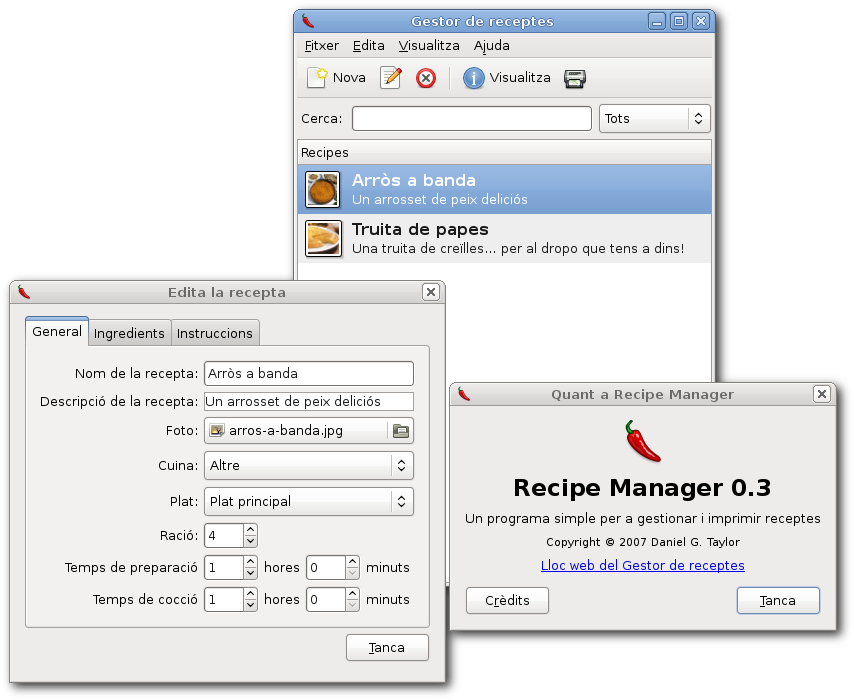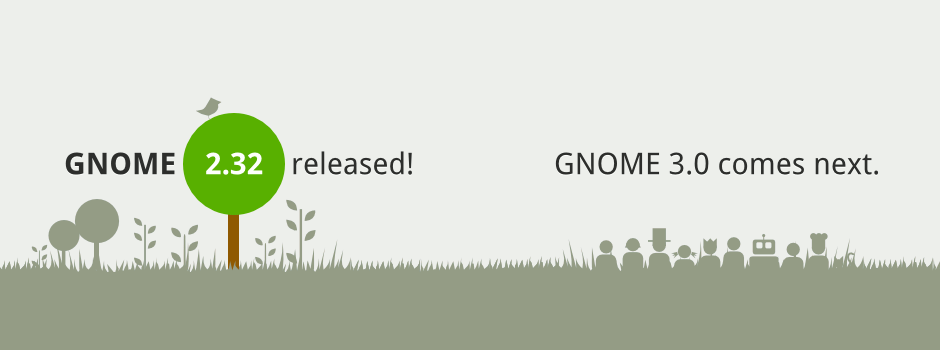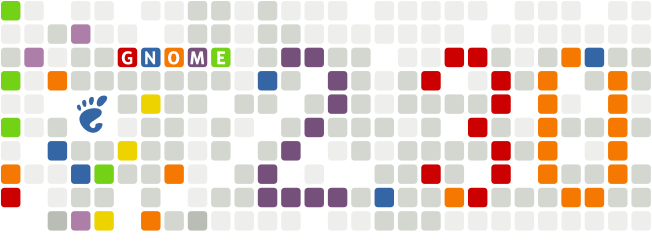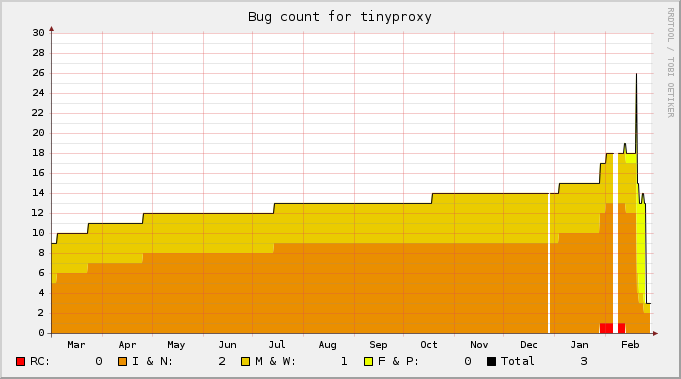GNOME 3.0
Yesterday one of my free software halves was very, very
happy, because after a lot of work,
GNOME 3 was released!

I've been following GNOME 3.0's development since Debian got the first
GNOME Shell snapshots uploaded to experimental. While my first experience,
on an old, 2 or 3 generations behind Athlon 800MHz with 512MB of RAM was
horrid due to the lack of features (it wasn't even an alpha!) and the
incredible slowness due to the crappy Radeon 9200, I've seen it evolve to
the gem that was released yesterday.
I haven't been so excited about GNOME since GTK+ and GNOME 2.0 were
released after their eternal development cycle, and was happy to see how
positive the atmosphere in #gnome-hackers was last night when
vuntz sent the email and
everyone was able to relax after a very long sprint of hard work.
Congratulations everyone, because not only this a great, solid release,
but it's also a brave one. Change does not come without resistance, but I
am very sure the path GNOME opened last night has a bright and innovative
future. I will be delighted to walk this path to enjoy it!

23:14 |
[] |
# |
(comments: 3)
New project to discuss
Reading Scott's recent
announcement
on his move to Google was both surprising and a pleasure. Surprising,
because it'll take time to stop associating his name to Ubuntu, Canonical,
and the nice experiences I had while I worked with them. A pleasure,
because his blog post was full of reminiscences of the very early days of
a project that ended up being way more successful in just a few years than
probably anyone in the Oxford conference could imagine.
Scott, best of luck for this new adventure!
Scott's write-up includes a sentence that made me remember I had been
wanting to write a blog post related to all of this, but was pending Mark
Shuttleworth's permission for posting:
Ok, Mark wasn’t really a Nigerian 419 scammer, but some people did
discard his e-mail as spam!
― Scott James Remnant
Many know the story of how I ended not being part of the
“Super-Secret-Debian-Startup” Scott mentions. I even wrote about it in a
blog post, 3 years
ago:
[...] nothing beats the next email which sat for some dramatic 6
months in my messy inbox until I found out in the worst of the possible
scenarios. Let's go back to late February, 2004, when I had no job, and I
didn't have a clue on what to do with my life.
From: Mark Shuttleworth <mark@hbd.com>
Subject: New project to discuss
To: Jordi Mallach <jordi@debian.org>
Date: Sun, 29 Feb 2004 18:33:51 +0000
[...]
I'm hiring a team of debian developers to work full time on a new
distribution based on Debian. We're making internationalisation a prime
focus, together with Python and regular release management. I've discussed
it with a number of Debian leaders and they're all very positive about it.
[...]
I'm not sure if I totally missed it as it came in, or I skimmed through it
and thought “WTF?! Dude on crack” or I just forgot “I need to reply to this
email”, but I'd swear it was the former. Not long after,
no-name-yet.com popped up, the rumours
started spreading around Debian channels. Luckily, I got a job at
LliureX two months later, where I worked
during the following 2½ years, but that's another story. I guess it was July
or so when Ubuntu was made public, and
Mark and his secret team organised a conference (blog entries
[1]
[2]
[3]
[4]
[5]),
just before the Warty release, and I was invited to it, for
the same reasons I got that email.
During that conference, probably because Mark sent me some email and I
applied a filter to get to it, I found the lost email, and felt like digging
a hole to hide for a LONG while. I couldn't believe the incredible opportunity
I had missed. I went to Mark and said "hey, you're not going to believe this",
and he did look quite surprised about someone being such an idiot.
I wonder if I should reply to his email today...
When the usual suspects in the secret Spanish Debian Cabal channel read this
blog post, they decided Mark deserved a reply, even if it would hit
his inbox more than three and a half years late. :)
With great care, we crafted an email that would look genuinely
stupid in late 2007, but just arrogant and idiotic in 2004, when “Ubuntu” was
just an African word, and the GNU/Linux distribution landscape was quickly
evolving ―at the time, Gentoo Linux had the “posh distribution” crown,
that Debian had held for quite a few years. I even took enough care to forge
the X-Operating-System and User-Agent headers so
they matched whatever was current in Debian in February 2004, and of
course, top-posting seemed most appropriate.
So Mark woke up that Monday, fired up his email client, and got... this:
Date: Mon, 1 Mar 2004 09:47:55 +0100
From: Jordi Mallach <jordi@sindominio.net>
To: Mark Shuttleworth <mark@hbd.com>
Subject: Re: New project to discuss
Organization: SinDominio
X-Operating-System: Debian GNU/Linux sid (Linux 2.6.3 i686)
User-Agent: Mutt/1.5.5.1+cvs20040105i
Hi Mark,
Thanks for your email. I nearly deleted this e-mail because for some
reason I thought it was targetted spam.
Your project looks very interesting, almost like a dream come true.
However, I feel a bit uneasy about your proposal. Something just doesn't
fit.
Why would someone start a company to work on /yet another/ Debian
derivative? Have you heard about Progeny's sad story? I think it's a
great example to show that Debian users don't want Debian-based distros,
they want people to work on the "real thing". Besides, I don't think
there's much more place for successful commercial distros, with Red Hat
and SuSE having well-established niches in the US and Europe.
Also, why focus on Debian specifically, Why not, for example, Gentoo,
which has a lot of buzz these days, and looks poised to be the next big
distribution?
To be honest, I think only a few people have the stamina or financial
stability to undertake a project like this, so I'd like to know
a bit more about you, and details on how you plan to sustain the
expenses.
Those are the main issues that worry me about your project. Other than
that, I would be interested in taking part in it, as I'm currently
unemployed and working on something Debian-based would be just too good
to miss.
You can reach me at +34 123 45 67 89, or if you feel like flying people
around Europe, I probably can be in the UK whenever it fits you.
Thanks, and hoping to hear from you again,
Jordi
On Sun, Feb 29, 2004 at 06:33:51PM +0000, Mark Shuttleworth wrote:
> Hi Jordi
>
> We haven't met, but both Jeff Waugh and Martin Michelmayr recommended that
> I get in touch with you in connection with a new project that I'm starting.
>
> I'm hiring a team of debian developers to work full time on a new
> distribution based on Debian. We're making internationalisation a prime
> focus, together with Python and regular release management. I've discussed
> it with a number of Debian leaders and they're all very positive about it.
>
> Would you be available to discuss it by telephone? I'm in the UK, so we
> could probably find a good timezoine easily enough ;-) Let me knof if
> you're keen to discuss it, when and what number to call.
>
> Cheers,
> Mark
>
> --
> Try Debian GNU/Linux. Software freedom for the bold, at www.debian.org
> http://www.markshuttleworth.com/
As you can imagine, his reaction was immediate:
Date: Mon, 22 Oct 2007 11:13:54 +0100
From: Mark Shuttleworth <mark@hbd.com>
To: Jordi Mallach <jordi@sindominio.net>
Subject: Re: New project to discuss
Jordi! I just got this now! Did you recently flush an old mail queue?
With thanks to all the Spanish Cabal members who were involved!
20:19 |
[] |
# |
(comments: 6)
Recipe Manager meets arròs a banda
Two weeks ago, nekohayo posted
a blog entry
on Recipe Manager,
a (you guessed it) cooking recipe manager for GNOME. Looking good, I fetched
the bzr tree from Launchpad and played a bit with it, and soon discovered
it had no internationalisation support.
I've tried to add i18n properly, but I've not had enough time to do it.
Before tackling that, the authors need to give it some bootstrapping love
so the app can actually install, look for its files in /usr/share,
etc.
My fugly, unpostable current patch does allow for a preview of how
Recipe Manager will teach the world about the best rice dish ever, arròs a
banda. Yum!

Recipe Manager, showing off the zenith of Valencian culture
00:12 |
[] |
# |
(comments: 4)
GNOME 2.32

Once again, the GNOME project has
released a major release on time, to the day. Congrats!
While it doesn't feel like a major release, due to the pushing back
of GNOME 3.0 another 6 months in the middle of the cycle and the limited
changes included, I believe it'll be a good one because it just adds on top
of the really solid GNOME 2.30.
GNOME 2.32 is out a bit too late for Debian squeeze, but the
Debian GNOME team has a plan™ to incorporate new 2.32 versions for modules
which don't include big, intrussive changes like migrations to
dconf, or any other dependency on the new versions of
GTK or GLib. The result is that Debian 6.0 will ship with most of GNOME
2.30, plus some cherrypicked new versions of 2.32 modules.
23:49 |
[] |
# |
(comments: 2)
GNOME 2.30

Congratulations to everyone involved in what looks like a very good GNOME
release!
Interesting times are now ahead for the GNOME project, as on the plate is
now a big release like 3.0. That will mean a lot of changes to the desktop
we've got used to in the last decade, and I hope it ends up being successful,
innovative and useful.
Debian has packages for GNOME Shell, and a special
gnome3-session which starts Mutter + Shell. I experimented
with it last week at my work place, and had mixed feelings with the current
status.
I'm not a big fan of hard dependencies on Direct Rendering. My main
computer is an Athlon 800MHz. Compiz crawls on it, and sadly Mutter
is basically unusable on it. At the office, I have P4-based system with 1GB
of RAM, which runs GNOME 2.28 OK. When I switched to the GNOME 3 session, it
showed that it's getting old. I also experienced X crashes and kernel
oopses, apparently a classic for ATI users using a composited window manager.
This being said, I consider myself lucky because both systems have ATI cards
and can do DRI using free software. If I was forced to use nVidia non-free
drivers, it'd probably mean I'd stick with the Panel until that wasn't an
option at all.
I am aware we'll see improvements both in Xorg/kernel and GNOME before
GNOME 3.0 is released next Autumn, and have high hopes for a release that
is accepted by our users really fast (avoiding a KDE 4.0 situation). GNOME
hackers have done good stuff for ages, and 3.0 will be a new example!
23:53 |
[] |
# |
(comments: 2)
Tinyproxy 1.8
A while ago, I was asked to recompile
Tinyproxy to enable transparent
proxying support, which was not being compiled in etch's Debian
package. As it tends to happen, once I got the source and looked into
doing a quick rebuild with --enable-transparent-proxy, I noticed
the package was in such a bad shape, that I couldn't just leave it like that,
so I found myself doing
a few more changes,
which mostly involved updating the packaging so it didn't suck a lot, and
splitting the Debian patches so things could be sent upstream or dropped when
new versions appeared.
However, even if Ed had asked me to go ahead and take over the package, this
was meant to be a one-day effort, and soon I had forgotten about Tinyproxy,
except for the ocassional bug mail getting through the PTS. It also didn't
help that Tinyproxy had been pretty much dead upstream for years.
So lately, a few bug reports were reporting a ∗gasp∗ new
major Tinyproxy release, after 7 years of basically nothing. OMG, what do I
see, there's a Git repo! And an upstream Bugzilla! Somehow, feeling I owed
Ed a reply to his unanswered request, I went ahead and tagged tinyproxy
1.6.3-3.2 in collab-maint, and started working on the new version. Adding
myself to Uploaders, and getting rid of the “make no unnecessary changes”
vetto, I rewrote
most of the packaging. And for a change, I looked for and found a #tinyproxy
channel on IRC and told muks and obnox that the days of Tinyproxy's stay in
the Debian/Ubuntu limbo were over.

They were happy to get a few bugs and patches forwareded upstream, and
asked me why all of this hadn't happened before. Pitty is that a few
longstanding issues were well known in Debian but not so obvious for the new
upstream maintainers, and are present in 1.8.0. Hopefully all will be
dealt with in 1.8.1 or the next major version. The lesson is: if you work on an
apparently abandoned package, after cleaning the mess in your NMU, try to
spend 15 more minutes trying to contact upstream (if available), pointing
them at the patch tracker and our list of bugs: chances are many are still
useful. Also, contact the Debian maintainer, and if they ask you to take over,
at least post a RFA so someone else can.
If you're a Tinyproxy user, I'd be happy to hear if the current package in
Debian unstable works for you. If you were having weird issues with 1.6.x,
chances are 1.8 will fix them. The package can be installed on stable
with no extra dependencies, so if you're feeling adventurous, go ahead and
upgrade.
23:44 |
[] |
# |
(comments: 2)
Ten years as a Debian Maintainer
On the 24th of November of 1999, the Debian ftpmasters processed the NEW
package wmbiff, which got
installed in the potato distribution.
This sponsored upload by Fernando Sánchez was the first of my packages to hit
the official Debian archive, thus
officially making me a Debian maintainer. So, in short, today is my tenth
anniversary as a Debian contributor!
I actually started
a few days before,
and soon after that upload, many other ITPs and uploads followed. I will
always be thankful to fer for his patience with my upload sponsoring until I
became a Debian developer with full rights and was able to upload myself.
During these years, I've been involved in many teams and different tasks,
with my activity and dedication probably peaking around 2001 or 2002, when
I apparently was doing a crazy amount of different stuff. I started doing
plain packaging work of software packages, some of which also
have come a long way
(thanks for that, Chris!), but soon started
to contribute in other Debian tasks. I think it's safe to say that the task
that has ended up having more impact in the people that surround me was
bootstrapping the
Debian Catalan community
and starting the
Catalan translation of Debian's website,
which soon after triggered the creation of a formal Debian Catalan translation
project.
I've also spent a lot of time giving back to the NM team which helped me
get a Debian account through the still experimental new New Maintainer
process, and the QA team helping as I could with the never ending release
cycles of potato and woody.
At some point I got engaged in the GNOME packaging tasks and the creation
of the Debian GNOME team,
and picked up the Catalan translation of GNOME 1.5.x releases, which eventually
opened me the doors of Softcatalà,
a Catalan non-profit devoted to the promotion of the Catalan language in
technology.
I've believed in Debian's values since my classmate Ulisses Alonso prodded
me to install Debian on my desktop back in 1997. Even if getting X up and
running on bo was a real pain in the ass, knowing that the system
I was running had all been written by people driven by altruism was
enlightening; months later it was time to give back.
Of course, I've not been able to keep my motivation or output as high as
I'd like. Debian as a collective has sometimes taken some decisions which were
not so easy to understand from my point of view. The outcome of the non-free
votes was a bit appalling, and having debian-devel becoming
more and more a battleground instead of a civilised mailing list certainly did
not help at some point (unsubscribing from it made my life a lot simpler!).
Joining a triathlon club, having a
girlfriend and suddenly rediscovering my neglected social life didn't help
either. The result is that my dedication has been wanning noticeably since
2005 or so, but I still do my best to keep up with most of duties, even if
I'm aware I'm clearly neglecting a few of them.
I am very proud of having been a part of an incredible project like Debian,
and hope to be around for at least ten more years. Not only because I love and
believe in Free Software; thanks to my involvement, I've been able to work
on Debian-related jobs for all of my professional career, but above all I've
been very lucky to make lots of real friends.
Today's has been a nice day full of remembering and mailbox digging. Thank
you, Debian!
23:47 |
[] |
# |
(comments: 11)
DebConf 9

It's taken me way too long to scribble these few lines, but I'm happy
to say that in about one hour, I'll be driving to Cáceres with
Sergio. After seven hours or so,
we should appear somewhere in Extremadura.
My priorities for this week are 1) having lots of fun with people I haven't
seen in ages, 2) catching up with all the Debian work I have neglected
lately, be it packaging or l10n, 3) enjoying Cáceres and Extremadura's
culture, as it's the first time I go past Madrid, and this is pretty much
uncharted territory for me, and 4) doing some kind of exercise, which means
letting bubulle kick my ass,
and finding a decent swimming pool around the venue.
See you tonight!
09:13 |
[] |
# |
(comments: 0)
An update on GRUB2
Some time ago I wrote about the
the state of GRUB2
and a milestone on getting it boot my Apple PowerBook G4 without manual
intervention. More than a year later, GRUB2 has changed and improved a lot,
as the community keeps growing and patches and ideas are continously being
posted.
Some months and commits after my previous post, GRUB broke again on
Apple OpenFirmware and I'd get dropped to OF console, the amount of
commits since the last known working version and the current SVN was quite
big, and although I was able to narrow it to a few suspicious changes, I had
no time to bisect it properly, and sadly I had to go back to
yaboot for a while.
But procrastinating sometimes helps, and when I should have been writing
and studying, on December I gave GRUB a new try on my laptop to see if a few
important changes to memory allocation would have changed anything. And it did!
So after fighting quite a few problems, I was able to
report partial success
to grub-devel.
Again, getting GRUB installed correctly was a bit challenging and needed
some hackery, due to incorrectly generated device.map, and the
linux module mysteriously not getting loaded. Luckily, Michel Dänzer found out
that this was due to a bug in sort ordering in the HFS module, which broke
the lookup of files with underscores like _linux.mod, and for
which he posted a possible fix by taking Linux's table of character
ordering, which is a blob of hex values.
GRUB developers didn't seem too happy about applying the patch:
they argument that a blob like that should be well documented or written
in some other more readable way, and there's a possible problem with the mix
of Linux GPLv2 and GRUB GPLv3+ codebases, if a table of data like what Michel
posted is actually copyrightable. The discussion ended up dying and nothing
was done... until Pavel Roskin
picked it up
weeks later and posted a new patch, based on hfsutils GPLv2+
code, which addressed these issues. The new patch seems to have a few issues,
which makes it fail as before, but hopefully it'll be fixed soon.
Additionally, I wasn't able to boot using UUIDs as the search commands
fails to detect the correct boot device on my system (but not on Michel's), so
I had to disable that in /etc/default/grub.
To workaround the linux module loading bug while the patch is fixed,
I just added this ugly hack to /etc/grub.d/09_local_prelinux:
#! /bin/sh -e
# Work-around for bugs in the hfs module which makes the load of
# linux.mod fail.
cat << EOF
insmod (hd,3)/usr/lib/grub/powerpc-ieee1275/_linux.mod
insmod linux
EOF
This is enough to get the initrd and linux
commands available. However, update-grub will still add search
commands to your menu entries even if you disabled UUID support; I can't
understand why, but I know it breaks on my PowerBook due to some OF rarety.
Just removing the line from the menu entry will leave me with a working
config that boots without any manual editing at GRUB prompt.
The latest GRUB snapshot in Debian fixes the device.map issue, but adds
one last
issue:
update-grub will fail due to some gfxterm detection code, a workaround is
to replace an exit 1 with exit 0 when this happens
in /etc/grub.d/00_header.
On the “weird architectures” front, it's worth noting that this month
Dave Miller popped up on the list and started posting patches to fix the rotten
SPARC port, and I think it's safe to assume that it'll be on an usable state
really soon. Impressive!
14:54 |
[] |
# |
(comments: 0)
GNOME 2.24 in Debian unstable, and the road ahead
GNOME 2.26 was
released last
week, and I couldn't help adding myself to the long list of celebrating
posts in Planet GNOME. Looking
at the release notes, it looks like this release adds a good number of very
visible features, and also keeps improving on ongoing transitions like
gvfs.

The Debian GNOME team is obviously not ignoring this fact and started to
work very hard on updating GNOME for squeeze as soon as the
lenny freeze was over.
First, the new versions of GLib and GTK+ were uploaded to unstable, and
managed to transition to testing very easily. The rest of GNOME 2.24 bits,
which had been patiently waiting on experimental for months, has been uploaded
with care not to disrupt any of the many transitions the Debian release team
is currently dealing with. You can have a quick glance at how things are going
in our 2.24 status page,
but the summary is that most of GNOME 2.24 is in unstable, with a few notable
exceptions which are held back by ongoing testing transitions. Namedly,
evolution-data-server is trying to trickle into testing, which
is in turn holding the final bits: gnome-panel, nautilus and related packages,
but we think this will be over soon.
As soon as GNOME 2.24 is safe in squeeze, we'll immediately
turn our focus to the new GNOME 2.26 release. Our initial plan is to
package
the trivial bits and leaf packages which can't break stuff for unstable, and
herd the more complex modules via experimental, to avoid breaking unstable
at all. There are some exceptions; we plan to keep gnome-session
2.22 in unstable/testing until 2.26.1 is released to avoid getting a
broken session saving
in Debian.
People might wonder why we insist on hitting what would seem a dead horse
by first dealing with 2.24 and not 2.26 directly. The main reason is that these
packages had been ready for a long time, and were in good shape to transition
to testing quickly and with little pain. Preparing 2.26 directly would mean
throwing away a lot of hours of packaging and polishing effort, and it's not
like we're releasing squeeze any time soon anyway.
Enjoy the hopefully not too bumpy road to 2.26!
00:32 |
[] |
# |
(comments: 7)
<< Page 1 of 16 >>












